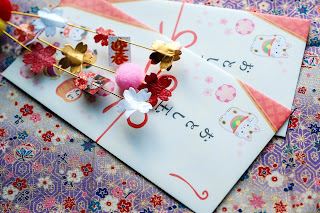Japanese tradition: New Year's Day is a time for "Otoshi-dama" !
In Japan, it is customary to give "Otoshi-dama(New Year's money)" to children during the New Year's holiday.
What is a "Otoshi-dama"? What is its meaning, origin and origin?
Why is it called a "Otoshi-dama" and what does it mean? What is "Otoshi-dama"?
Otoshi-dama, a New Year's tradition in Japan, is a gift of money or goods given in celebration of the New Year. It is given mainly from adults to children and from superiors to subordinates.
The current "Otoshi-dama" is an allowance for children for the New Year, but it actually has a deeper meaning than that of the original New Year's event.
It originated not with money, but with rice cakes.
Today's "Otoshi-dama" is mostly money, but originally it was rice cakes. However, it was not just a rice cake,because it was a symbol of "soul".
In the old days, it was believed that at the beginning of each year, the spirit of the New Year was shared from the New Year God, or in other words, each year's power was bestowed on us for the entire year.
To begin with, a series of New Year's events are held to welcome, entertain, and send off the "New Year God" at home. The New Year God is believed to share his spirit with us, along with happiness and blessings for the new year.
The Change of "Otoshi-dama" from Rice Cakes to Money for Children
There are various theories as to when the "Otoshi-dama" started, but it is said that it became popular among the general public during the Edo period (1603-1868). In addition to rice cakes, gifts of goods and money were also given, and these gifts at the beginning of the year came to be called "Otoshi-dama".
The custom of giving Otoshi-dama was passed down through the Meiji, Taisho, and Showa eras, but from around the period of rapid economic growth in the late 1950s, money became the norm, especially in urban areas, and the recipients of such gifts are said to have been children exclusively.
Since the Otoshi-dama is given from the superior to the inferior, such as from the patriarch to his family, from the master to his servants, and from the master to his disciples, "Onenga" and "Onenshi" are used for other occasions. Therefore, the custom of giving Otoshi-dama to children seems to have changed, as the use of New Year's money for exchanges between adults has decreased.
What is the manner of "Otoshi-dama"?
There are several manners when giving "Otoshi-dama".
For example, new bills should be given, and the amount of money should be an odd number.
In addition, it is acceptable for a superior person to give a New Year's gift to a younger person, but conversely, it is not acceptable for a junior person to give a senior person a "Otoshi-dama".
This is also true for children of superiors, and if you want to give them something other than cash, it is better to give them something other than cash.
In Japan, money other than for buying and selling is supposed to be wrapped and handed over, so it should not be handed over as it is. It is considered rude. Wrap the money in white paper (kaishi is best) or tissue paper if you do not have one, and apologize for not having a bag.
When placing banknotes in the bag, the side with the portrait is the front. For coins, the side with the year of manufacture is considered the reverse side, and the side with the design and Chinese numerals is the front.
Origin of Pochi Bags
"Pochi-bukuro(Pochi bags)" is indispensable when giving Otoshi-dama. Pochi-bukuro is used for small amounts of money such as tips, gratuities, and Otoshi-dama.
Pochi-bukuro were originally used by customers to give gratuities to geisha, and ryokan workers. "Pochi" means "a small dot," and in the Kansai language "pochitto" means "a little.



